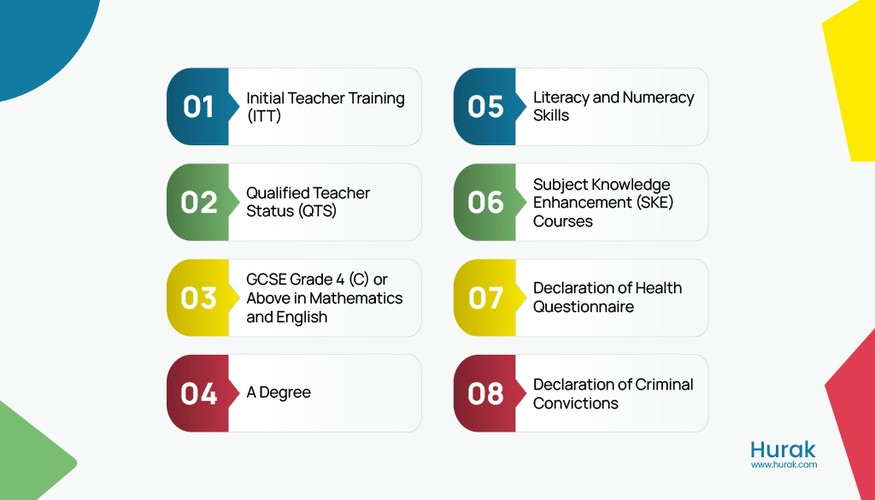What Degree Do I Need to Be a Teacher?
In England, to work as a teacher in maintained primary, secondary, or special schools (those supported by local authorities), one must hold qualified teacher status (QTS), which can be obtained through training.
You do not require QTS to teach in the early years or higher education. Many training pathways offer QTS and the chance to train in various environments. Many pathways also allow you to earn a Postgraduate Certificate of Education (PGCE).
Qualifications Required to Begin a Career in Teaching
To become a certified teacher in England, you need to fulfil the following requirements:

Initial Teacher Training (ITT)
To become a qualified teacher in state-maintained schools across the UK, you must undertake Initial Teacher Training (ITT) or Initial Teacher Education (ITE). Entry is generally competitive, although less so in fields with a shortage, like math, physics, and languages.
Qualified Teacher Status (QTS)
Completing ITT leads to Qualified Teacher Status (QTS) in England and Wales and Teaching Qualification (TQ) in Scotland. However, there are independent schools, academies, and free schools that may not list QTS or teaching council registration as prerequisites.
GCSE Grade 4 (C) or Above in Mathematics and English
You also require GCSE science at grade 4 (C) or above if you want to teach in primary or early childhood education. Some teacher training providers might accept an equivalency test or additional qualifications.
A Degree
Certain initial teacher training (ITT) institutions require a degree in a national curriculum subject before they will accept you for primary teaching. If you still need to, you want to speak with the training provider immediately to determine if they’ll accept your degree. For secondary teaching, you’ll need a degree in (or closely related to) the subject you want to teach.
Literacy and Numeracy Skills
ITT providers must guarantee that aspiring educators fulfil the literacy and numeracy requirements for teaching. All providers will evaluate applicants’ skills either during the selection process or after they start the training program.
If necessary, you will receive assistance to strengthen your abilities during the course, and you will be assessed against a predetermined set of literacy and numeracy skills by the end of your program. However, trainees who cannot meet the required level of literacy and numeracy skills will not reach QTS.
Subject Knowledge Enhancement (SKE) Courses
You could enrol on a Subject Knowledge Enhancement (SKE) course if you want to teach a subject but need to learn more beforehand. They can be especially useful if you have an A level in that subject but a degree in something else if you studied a language but need to improve it to a level suitable for teaching in schools, or if you have a degree in something else but professional experience in a related field.
You can determine whether you need to finish an SKE with the teacher training course provider; these are usually offered for courses with a teacher shortage. The course, which is typically completed online, can be taken in addition to or instead of your initial teacher training programme.
Declaration of Health Questionnaire
Before starting the ITT course, please fill out a statement of health questionnaire. The Equality Act of 2010 protects any disability-related information you disclose. If you are disabled, you have to get in touch with the training provider.
Declaration of Criminal Convictions
The teaching profession is exempt from the Rehabilitation of Offenders Act 1974’s provisions, which permit convictions for criminal offences to be considered “spent” after a certain amount of time. You must disclose any prior convictions. Before beginning their school-based training, all trainee teachers have their criminal records checked by the Disclosure and Barring Service (DBS).
FAQs
Do you need a PGCE to teach?
PGCE stands for a postgraduate certificate in education, an academic qualification. You must take teaching training to achieve it. Although having this qualification is not a requirement to become a certified teacher in the UK, it can improve your knowledge and abilities.
Can I be a teacher with a third-class degree?
Even if you have a third-class degree, you might still be considered, especially if you have earned a master’s degree or relevant professional experience.
Do I need a degree to be a teacher?
Since QTS isn’t often required by academies, free schools, independent schools, or colleges for further education (FE), it is also possible to teach without a degree. On the other hand, a degree can help you change jobs and advance your professional chances.
What skills should teachers have?
A teacher should have critical thinking, patience, communication, organisational skills, creative thinking abilities, leadership skills, a capacity for teamwork, and time management skills.
How to become a teacher in the UK?
A degree, often a Bachelor of Education (B.Ed.) or a degree in a relevant field followed by a postgraduate teaching certification, such as a PGCE (Postgraduate Certificate in Education), is normally required to become a teacher in the UK. In addition, you’ll need to obtain experience through teaching placements and pass background checks, including a Disclosure and Barring Service (DBS) check.
What qualifications do I need to be a primary school teacher in the UK?
In the UK, a degree, GCSEs (or equivalent) at grade C/4 or above in English, Math, and Science, and passing the professional skills examinations in literacy and numeracy are requirements for becoming a primary school teacher. You will also have to finish a teacher training course.



